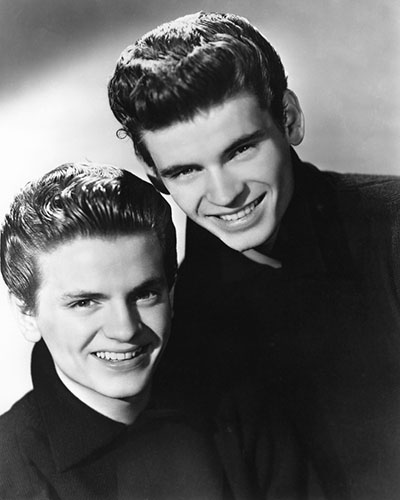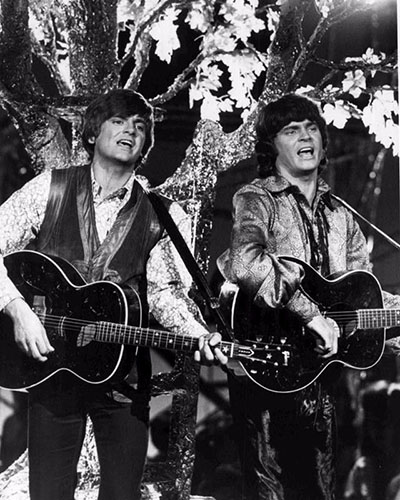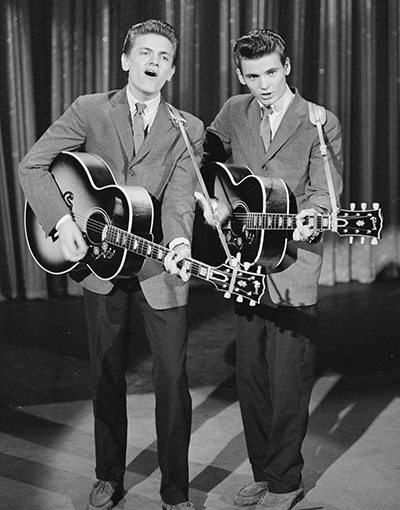|
DON & PHIL: THE EVERLY BROTHERS: HEAVENLY HARMONIES... EVERLYS EVERMORE PCC's Vintage Interview with the Legendary Duo
By Paul Freeman [1990 Feature Story] The Everly Brothers, Don and Phil, began performing as kids, on the family country music radio show. With their stirring blood harmonies, the duo became a rock 'n' roll sensation in the 50s. They always had a tempestuous relationship, due to differing politics, lifestyles and other divides. So they split up in 1973. But the music forever bonded the pair. In 1983, they reunited, their harmonies sounding just as amazing as ever. They continued to perform through 2005, when they toured the U.K. Phil Everly passed in 2014, at age 74, succumbing to lung disease. In the final years, they were again estranged. But the vibrant music the brothers created together still resonates, moving listeners and influencing new generations of artists. In the 50s, rock 'n' rollers, armed with an electrifying array of sounds and images, exploded onto the musical scene. Elvis Presley sneered, wailed and moved in a manner that shocked the "I Like Ike" segment of the population. Jerry Lee Lewis did a whole lotta shakin' at his piano. Chuck Berry duck-walked and played his guitar just like a ringin' bell. When it came to outrageousness, no one topped Little Richard, who whooped as if someone had squeezed his Tutti Frutti. Heavenly harmony was the trademark of The Everly Brothers. Hellish personal dissonance eventually split them. But in the late 50s and early 60s, their voices meshed sweetly, sending chills up the spines of listeners. Among their many unforgettable hits of the era were "Bye Bye Love," "All I Have to Do Is Dream," "When Will I Be Loved" and "Cathy's Clown." The brothers released critically acclaimed albums in the latter part of the 60s, but received little attention from radio or the public. The duo broke up in the 70s and found limited commercial success with some impressive solo projects. In 1983, they reunited for a concert at London's Royal Albert Hall. As they enter the 90s, Don and Phil Everly are amicably, productively performing and recording together. Their shimmering music magically bridges generations.
"It just seemed to be the natural thing to do," Don says. "It was kind of an apprenticeship." Phil adds, "If Dad had had a cow, we'd have wound up being able to milk a cow. It just so happened Dad was a musician -- so we learned the family craft. He was progressive in technological terms. He had a home recording set-up way before tape. We could record on acetate. It was a big advantage to be able to sing into a microphone and hear yourself back. It gave us a head start on a lifetime of recording." The Everly Brothers drew from a multitude of influences. "When I was 10 or 12," Don recalls, "I saw Hank Williams at the Grand Ole Opry and fell in love with his stuff. My life was never the same. He was incredible, totally different from anything I'd ever experienced musically -- the way he crouched over the microphone, the rhythm, the songs. "I liked a lot of different things on the radio, from Lefty Frizzell to Jo Stafford and Johnny Ray to ethnic and spiritual music." Phil says Ike Everly helped the boys develop an appreciation for many musical forms. "A radio station was getting rid of all of their old 78s, so Dad brought all of them to us. Don and I spent our time fooling around with these records. We were into country music and, all of a sudden, we're hearing Ravel's "Bolero" and all sorts of stuff. Dad was smart enough to bring them home and then leave us to our own devices. So, having been exposed to so many different kinds of music, we were very open to new ideas. There's something good in everything, if you take enough time to allow it to reach you." By the age of 16, Don was creating music of his own. With the aid of family friend Chet Atkins, he got several of his original compositions recorded including "Thou Shalt Not Steal," which became a hit for country star Kitty Wells. When the family radio show was canceled, the brothers went to Nashville, seeking a recording contract. Columbia signed them and they recorded one of Don's tunes, 1955's "Keep A-Lovin' Me," but the single disappeared without a trace and the record company dropped them. They were turned down by just about every label in town before Cadence finally decided to take a chance on them. The Everly Brothers rewarded that label by delivering a long string of smash singles, including the number one hit, "Wake Up Little Susie." They crossed over from the country charts to pop. Rock 'n' roll had fascinated the brothers since they first heard it. "In the 50s," Phil relates, "it was very important to be cool. What music you listened to had a lot to do with that. In my school, you never did another guy's dance steps. You had to think up your own. If you used another guy's steps, you had to ask permission. That's what I did, because I never could make up my own. "Don and I were two of three kids in school who had duck tails. I was 13. Flat tops, which are back in style now, were the prominent haircut. We were generals in the hair wars." Phil and Don incorporated rock 'n' roll sensibilities into their country roots. "We had Hank Williams on one side and the beat on the other," Phil says. "Basically, what was referred to as rockabilly when we started was really a combination of the blues on both sides of the races." Don says, "When I was in junior high, rock 'n' roll was just starting to happen and I was listening to Chuck Berry and Bo Diddley. I turned my guitar like Bo Diddley's and I was singing country. We mixed it together and what happened was the sound of The Everly Brothers. "Dad had taught us to sing together. There was a tradition of brother acts in country music. We felt we were following in the footsteps of other similar acts. But, in pop music, our sound was considered unique."
The brothers were surprised that their music offended the conservative element. "We never tried to be controversial. If they were taking pictures of us, we wouldn't even light up a cigarette. We certainly weren't the bad boys of rock," Don says. "But some people thought that all rock 'n' roll was the devil's music. They believed we were evil, when were singing songs like, 'All I Have to Do Is Dream' -- can you imagine? Steve Allen made fun of the lyrics. The 50s were real uncool. There was segregation. If you had long hair, it was just as bad as being black, sometimes. "The media didn't like rock 'n' roll," Don continues. "They still wanted to hear big band music. They resisted anything new. It's taken people's attitudes a long time to come around to where they accept being a little different. Rock 'n' roll had a lot to do with breaking down the barriers." The Everlys were caught up in the fun and excitement of early rock. "I always call it 'the golden age,' Phil says. "It was magic. There was a camaraderie. There'd be big package tours where we'd be performing with Buddy Holly and The Crickets, Eddie Cochran, Clyde McPhatter and on an on. We'd be riding a bus together. I guess it was like being in a fraternity. We gained road knowledge. It was wonderful." The press proclaimed that rock 'n' roll was a craze that would quickly die. "Almost all of us believed it," Phil says. "If you hear something said often enough, you'll believe. So many people wanted this music to go away. Our father told us, 'Nothing lasts forever.' We had been musicians all our lives. We knew careers had ups and downs. You just hope to finish with some sort of respect. We lucked out." The brothers' luck almost ran out in the mid-60s, when the wave of British bands knocked 50s rockers towards oblivion. Phil says, "In the music business, success became too much of a question of merchandising. Instead of acts really happening, acts were manufactured. I've always had regret that, because of the British Invasion, we lost a tremendous amount of American rock that would have come up and been discovered. "The whole thing had to do with America's whole attitude towards the English, in general. We see them as a kind of upper crust. Their approval of rock music gave it credibility. President Johnson's daughter was a Beatles fan. Before that, nobody from the establishment wanted to admit to liking rock 'n' roll. Only folk music was accepted. Finally people were no longer asking rock musicians, 'What are you going to do when it's over?' With The Beatles, rock 'n' roll became a respectable profession."
Don says, "We made a lot of good records in that period, but people were already seeing us as part of the past. It was frustrating." Ironically, The Beatles credited The Everly Brothers as being one of their major influences. "It was so funny," Don says. "We were the number one vocal group in the world until The Beatles. I remember arriving in London, where we were still as popular as ever, and the press was all there. They said, "We're not here to talk about you. We want to know what you think of our Beatles.' No one in England had ever done anything on an internationally successful level before. The music had all been imported. There was a time when, if you were English, you couldn't get on the English charts. The Beatles changed all that. "The fact is, they probably saved rock 'n' roll. I didn't want it all to sound the same. Some of the music had been getting pretty sterile." The Everly Brothers remained a viable concert attraction until 1973, when, during a performance at Knott's Berry Farm, they bitterly dissolved their act. According to rumor, they did not speak to one another for years. "That was a turbulent time," Don laments. "We just went our separate ways. By then, we'd been working together for 20 years. We needed some time apart, to discover ourselves. We'd grown up together in the business. Maybe as children, there was something missing in terms of emotional development. You have to be on your own sometimes. That's not easy to do. It's still not easy. But now I like being an Everly brother. I couldn't always say that." Phil does not waste time on regrets. "You'd have to be really unhappy to look back and say, 'We wasted 10 years.' Everything that happens to one in life has a purpose. If it doesn't seem so in the beginning, it will eventually, if you think long enough about it. The most important thing is that almost everybody has somebody they're not reconciled with and no one should go through life with that burden. We no longer have to." In 1983, their triumphant London reunion concert was a signal of an Everly Brothers rebirth. Besides a two-disc, live recording of that historic show, the brothers have issued three recent albums, "EB '84," "Born Yesterday" and "Some Hearts." Their relationship seems to be on solid ground. Last year, as a 50th birthday present, Don surprised his brother by completely refurbishing the 1960 Cadillac Phil used to drive. Two years earlier, on the occasion of Don's 50th, Phil had given him a custom-made Gibson guitar inlaid with a pound of gold. "We knew we had to be more mature than we were the last time around... and we are," Phil says. "We're probably together more and talk more and are closer than most brothers. We laugh about that fact. We just have to respect each other, like in a marriage. We're strong on family ties and blood is important."
The Everly Brothers, among the first inductees in the Rock and Roll Hall of Fame, don't plan to rest on their laurels. "I've always believed that the music business didn't have any age limits," Don says. "Country music certainly never has. There were guys like Grandpa Jones going out on stage, dressed up like old men. I just never thought about getting too old to be a rock 'n' roller." Meanwhile, the classic rock records The Everly Brothers made in the 50s seem destined to spin into infinity. "There is no logic in throwing music away," Phil says. "You might throw a book away once you've read it. But a piece of music isn't ever totally read, because it is so connected to your inner feelings." Be sure to check out PCC's 1994 interview with Don Everly: http://popcultureclassics.com/don_everly.html |




